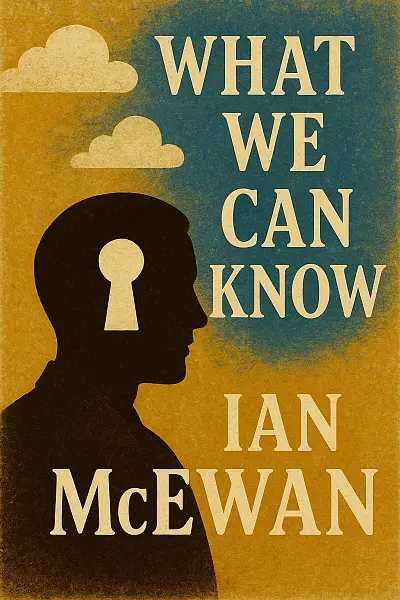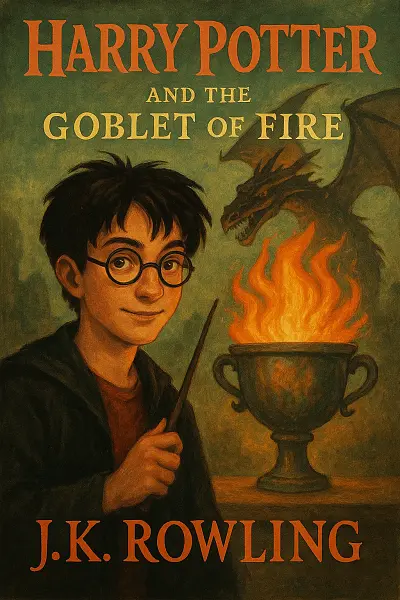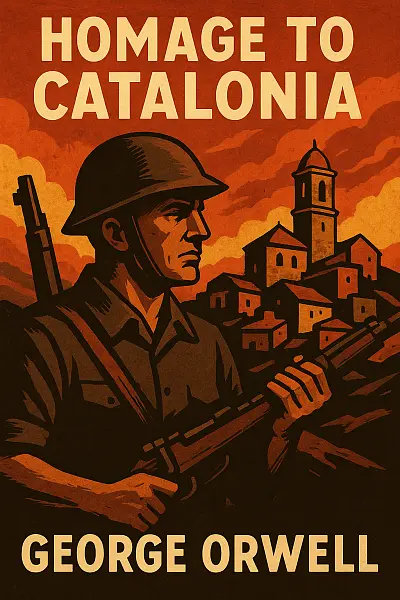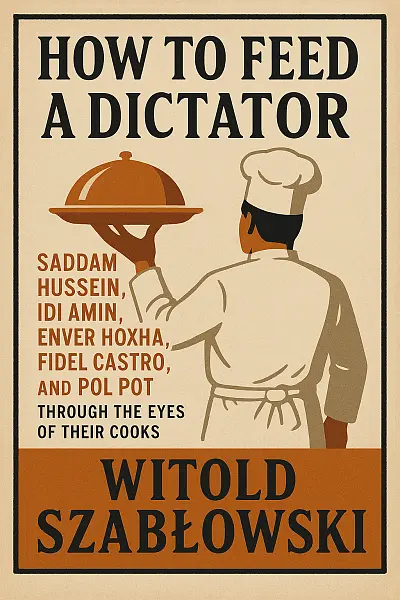
What We Can Know
by: Ian McEwan
Tom Metcalfe teaches at a flooded, fragmented Britain, haunted by the richness of all that's been lost to rising seas. Every day he immerses himself in the archives, mesmerized by the vanished freedoms of earlier generations, quietly longing to uncover something that brings that world closer.
That spark comes when Tom stumbles on a cryptic clue—the trail to an epic poem read only once, never heard again, but obsessed over for centuries. Suddenly, he's chasing more than just a mystery: the chance to recover a piece of humanity’s soul.
As he delves deeper, love and betrayal unravel the neat lines of his life, throwing everything he trusts into doubt.
Does he dare pursue the truth, even if it turns his world upside down? McEwan weaves it all together with his signature lyricism and sharp eye for regret and hope. You're left gripped, dying to know—will Tom find what he seeks, or is some knowledge too costly?
"Certainty is a comfort we invent; true wisdom lies in making peace with all that may remain unknown."
Let's Break This Down
The Author's Voice
Atmosphere:
Expect a restrained yet quietly intense ambiance, where tension simmers beneath the surface. McEwan crafts everyday settings that feel both immediately familiar and subtly uncanny, drawing you in with a sense of underlying unease. There’s a persistent thread of intellectual curiosity woven through the pages—every room, conversation, and silence pulses with possibility and gentle foreboding.
Prose Style:
McEwan’s writing is precise, meticulous, and quietly elegant. You’ll notice sentences that flow with surgical clarity—never showy, but always purposefully constructed. His diction leans literary but remains accessible, sprinkled with striking turns of phrase that make you pause and savor the moment. Dialogue is crisp, often carrying subtext and unspoken emotional heft.
Pacing:
The pace is best described as measured and deliberate. McEwan builds suspense gradually, allowing the philosophical and emotional weight to deepen over time. Don’t expect constant action; instead, there’s a steady, introspective rhythm that rewards patient readers—giving space to linger on ideas, observations, and the minutiae of everyday life.
Character Development:
Characters are richly introspective and psychologically complex. McEwan excels at exploring internal conflict and hidden motivations, using subtle gestures and inner monologues to reveal layers. Relationships feel authentic, often defined by tiny miscommunications and unspoken longing, giving even secondary characters surprising depth.
Themes:
At the heart of the novel are questions of knowledge, perception, and trust. McEwan invites you to grapple with ambiguity—what’s known, unknown, and unknowable. There’s a philosophical undercurrent that seamlessly blends with the narrative, resulting in a thoughtful meditation on what it means to understand another human being.
Overall Feel:
Prepare for a quietly riveting reading experience that’s both intellectually stimulating and emotionally resonant. McEwan’s style is perfect for those who relish subtlety, nuance, and deeply considered prose—ideal if you love sinking into a world where every detail matters, and every sentence asks you to look a little closer.
Key Moments
-
Brainy banter about quantum physics, sprinkled with wry British humor
-
Dinner party meltdown at the heart of the scientific debate — secrets spill faster than the wine
-
Scene-stealing sidekick: The sister with the razor wit, always one step ahead of everyone’s existential dread
-
McEwan’s signature prose: crystal-clear sentences that spiral into philosophical doubt
-
That moment when probability crushes hope—pure gut punch, totally unforgettable
-
A relentless tug-of-war between skepticism and faith—all played out in a single rainy afternoon
-
Clever callbacks to Schrödinger’s cat that linger long after you’ve turned the page
Plot Summary
What We Can Know by Ian McEwan traces the intertwined lives of three characters—Tom, a skeptical philosophy lecturer; his estranged wife Claire, a neuroscientist; and their precocious teenage daughter, Sophie. It all kicks off with Tom’s existential crisis as he’s forced to reconcile his rational worldview with baffling events—a mysterious letter from Claire’s past resurfaces, revealing an affair that challenges the very basis of trust in their marriage. Sophie, meanwhile, gets swept up in a series of quantum experiments at Claire’s lab, blurring the line between science and faith as she begins to question reality itself. The story builds to a confrontation when Tom uncovers evidence that suggests Claire’s research may have manipulated both their lives and memories, culminating in a tense dinner scene where secrets and betrayals explode into the open. In the final act, each character is left to grapple with forgiveness, acceptance, and the limits of human understanding, ending on a surprisingly hopeful note about the mysteries that bind families together.
Character Analysis
Tom starts out as a rigid materialist, almost comically sure that everything has a logical explanation—but his arc is all about crumbling certainty. By the end, he’s forced to accept ambiguity and even a measure of wonder. Claire is complex: initially presented as a cold, driven scientist, but as her backstory unfolds, layers of regret and yearning for connection emerge—her arc centers on vulnerability and the risk of truth. Sophie might be the most dynamic, oscillating between adolescent rebellion and moments of startling insight; her journey is about forming her own identity and reconciling her parents’ mistakes with her own burgeoning curiosity. Each character undergoes a genuine transformation, shaped as much by their clashes as by moments of quiet empathy.
Major Themes
McEwan dives deep into the tension between certainty and ambiguity—science versus faith, evidence versus belief—especially through Tom and Claire’s marriage. Memory and the unreliability of perception comes up again and again: Claire’s research into memory manipulation becomes a metaphor for the stories we tell ourselves. There’s also family as both a source of truth and confusion; the trio’s often-messy interactions highlight how love and miscommunication can coexist. Finally, the novel wrestles with the ethics of scientific progress—who gets to decide what we know, and at what cost? These themes are skillfully interwoven, fleshed out in both big, dramatic reveals and small, quiet moments.
Literary Techniques & Style
McEwan’s prose is characteristically precise and nuanced, laced with sardonic humor and sharp dialogue. The narrative is layered and nonlinear, jumping between Tom’s snarky first-person perspective, Claire’s internal monologues, and excerpts from Sophie’s journal—a technique that keeps readers guessing about what’s truly “real.” Symbolism is everywhere: Sophie’s Schrödinger’s cat experiment stands in for the family’s uncertain emotional state, while recurring images of mirrors and doubles underscore the theme of unreliable perception. Metaphors abound, particularly around memory as a “fragile tape reel,” which neatly ties the scientific threads to the novel’s emotional core.
Historical/Cultural Context
Set in contemporary London, the story unfolds against a backdrop of rapid scientific advancement and cultural debates about the limits of knowledge—think post-truth politics, data privacy, and the role of AI in daily life. McEwan subtly references the ethical anxieties surrounding neuroscience and memory research, drawing on real-world debates to ground his speculative plot. The family’s dynamic also reflects broader shifts in attitudes toward marriage, gender roles, and the responsibilities of raising a child in a hyper-connected age.
Critical Significance & Impact
What We Can Know has been celebrated for its ambitious blending of domestic drama with big existential questions, cementing McEwan’s reputation for tackling the intellectual dilemmas of our time in accessible, gripping narratives. While some critics found the mid-novel exposition heavy-handed, many applaud the book’s originality, emotional honesty, and wit. It’s a valuable conversation starter about the boundaries of science and selfhood, and it definitely lingers in the mind—whether you agree with McEwan’s worldview or not.

When memory lies, truth unravels—in a future shaped by forgotten pasts
What Readers Are Saying
Right for You If
If you’re that friend who loves to get lost in big, rewarding ideas—think philosophy, consciousness, and those “what does it all mean?” late-night conversations—then What We Can Know is totally up your alley. Ian McEwan brings his signature thoughtful, nuanced style to some seriously mind-bending questions, so if you’re into books that make you think and argue (in a good way) with yourself, you’ll probably have a blast.
Here’s who will be obsessed:
- Folks who eat up literary fiction with a philosophical twist
- Readers who appreciate beautifully crafted sentences and subtle emotional depth
- People who loved McEwan’s other thought-provoking novels—if you liked Atonement or Machines Like Me, this one’s a natural fit
- Anyone who gets excited about exploring the limits of knowledge, memory, and perception
But honestly, it’s not for everyone.
If you want fast-paced stories, lots of action, or clear-cut answers, you might end up frustrated. The pacing here is pretty reflective, and McEwan likes to linger on the gray areas rather than wrap things up neatly. If you need your books to be plot-driven or super accessible, you may want to skip this one.
In short:
Pick this up if you’re in the mood for a smart, beautifully-written deep dive into what it means to know anything—and don’t mind sitting with questions that don’t have easy answers. If you’re looking for heart-pounding adventure or a quick escape, there are definitely better fits out there.
What You're Getting Into
Ever wondered what separates what we know from what we think we know?
Ian McEwan's What We Can Know drops us into the tangled lives of an unforgettable cast, where a single, shattering event forces everyone to confront hidden truths and the slippery nature of reality itself.
Witty, profound, and tinged with suspense, this novel explores the blurry line between perception and certainty as secrets unravel and relationships are pushed to their limits.
Characters You'll Meet
-
Rowland Hill: Central character whose scientific curiosity and obsession with knowledge set the novel’s events in motion. His intellectual ambition often clashes with emotional intimacy, shaping his journey.
-
Eleanor Hill: Rowland’s wife, a grounding presence who provides emotional balance. Her support is unwavering, but she struggles with her own doubts as Rowland’s quest intensifies.
-
Heidi Reimler: Brilliant physicist and Rowland’s close collaborator. Her pragmatic outlook and rivalry with Rowland drive key conflicts and highlight the tension between personal ambition and collective progress.
-
Oliver Vesey: Young, idealistic protégé inspired by Rowland’s theories. His evolving perspective on science and ethics brings fresh energy—and complication—to the group’s dynamic.
-
Lionel Carver: Charismatic science skeptic whose philosophical challenges force the protagonists to question their assumptions. His presence is disruptive but ultimately deepens the book’s exploration of knowledge and truth.
More Like This
If you found yourself swept up by the existential musings and ensemble storytelling of Julian Barnes’ The Sense of an Ending, What We Can Know will strike a familiar, deeply resonant note. Both novels unfold the mysteries of memory and the slipperiness of truth, prompting readers to question the very foundation of what we claim to know about ourselves and others. Where Barnes weaves understated revelations into the everyday, McEwan pushes these contemplations further, often with a sharper, more clinical wit.
Similarly, fans of Kazuo Ishiguro’s Never Let Me Go will recognize echoes in McEwan’s tender yet chilling exploration of human identity and the ethical dilemmas at the heart of scientific progress. There’s that same feeling of quiet dread and understated heartbreak, punctuated by surprisingly intimate moments that linger long after the last page.
On the screen, if The OA grabbed your imagination with its blurred lines between science, faith, and the unknowable, then McEwan’s novel tugs at the same threads—mysterious, cerebral, and flush with both skepticism and wonder. The way the narrative dances between hard logic and metaphysical possibilities will remind you of moments in the show where reality feels mutable, always just out of reach, both unsettling and mesmerizing.
Critic's Corner
What if the records of our best moments—art, insight, love—were shattered, and all we could piece together was a tantalizing absence? What We Can Know spins this question into a luminous and unsettling meditation on our longing for connection, truth, and permanence—in a world where each feels heartbreakingly out of reach.
Let’s talk about craft, because McEwan’s signature brilliance is everywhere, yet it’s more restrained than in his earlier works. The prose is elegant without flourish, deliberate yet never flat—even as he writes of drowned geographies and uneasy futures. Through Tom’s archival obsession, McEwan subtly layers timelines, using archival fragments and shifting perspectives to blur the boundary between history and myth. Dialogue feels lived-in, intimate—his characters’ clipped exchanges press against the silence of what’s been lost. Occasionally, the novel’s pacing wavers; scenes of academic life can flatten the narrative’s charge, especially in the middle third. Still, McEwan’s grasp of rhythm—sudden tenderness followed by chilling detachment—keeps the reader leaning forward. His language holds both mourning and wonder, never indulging in dystopian melodrama: the world may be ending, but McEwan refuses to let the poetic slip away.
Themes run deep and surprisingly contemporary. At its heart, this is a novel about memory versus oblivion—how history, once fragmented, is rewritten by nostalgia, desire, and the shadows of guilt. The lost poem is more than a MacGuffin; it becomes a metaphor for everything personal and collective that we strive to recover, even as waves erase the shoreline. Environmental collapse hovers unavoidably, yet McEwan dodges both polemic and despair: the novel embraces the granular textures of survival—the attempts to love and listen, even as the legacy of a “richer” world leaks away. There’s a haunted warmth in how relationships are mapped, especially as Tom’s search exposes the fragile artistry of ordinary connection. Where McEwan sparks intellectually is in forcing his readers to ask: What remains of us, once the record fails?—and, more slyly, Are we complicit in curating our own selective histories?
Compared to McEwan’s earlier fiction (Atonement’s remorse, Solar’s irony), What We Can Know feels simultaneously more intimate and more speculative. Fans of cli-fi (climate fiction) will find echoes of Margaret Atwood’s MaddAddam trilogy, but McEwan’s approach resists genre conventions—his apocalypse is quieter, sadder, and oddly affirming. He’s less interested in spectacle than in the soft ache of personal mythmaking.
McEwan delivers a thoughtful, beautifully constructed novel that’s occasionally weighed down by exposition but ultimately triumphs through its emotional intimacy and philosophical ambition. Its biggest risk—choosing art over action—proves a gamble worth taking. For those who want their fiction to linger long after the last page, this is essential reading.
Community Thoughts
I didn’t sleep after reading the part where the whole foundation of reality gets questioned. My mind kept spinning around that, replaying the moment everything shifted. McEwan really knows how to mess with your sense of certainty.
I swear, I actually had to set the book down after reading that bizarre dinner scene with Fiona and her brother. The tension just kept building until my heart was pounding. McEwan, what are you doing to me?
why did McEwan have to mess with my head like that? I kept replaying the scene with Clara and the blue envelope for hours. My brain refused to shut down, thanks a lot.
i couldn't stop thinking about that scene where the characters debate what certainty really means. it spun my mind for hours after. McEwan's writing made me question everything I thought I understood.
I still hear Raymond’s nervous laugh echoing in my head. McEwan’s portrayal of him made me question my own memories, as if my past was also up for revision. That one character just won’t leave me alone.
Leave Your Review
Local Take
Why It Matters
What We Can Know by Ian McEwan sparks intriguing parallels in this cultural context, especially when you consider recent national debates around truth, privacy, and personal agency.
-
The book’s exploration of scientific responsibility and moral ambiguity instantly recalls local discussions stemming from high-profile science scandals and social reckonings—think debates over technology, medical ethics, and the fine line between individual rights and collective safety.
-
Cultural values here often emphasize communal harmony and duty over individual pursuit, which both aligns with and challenges McEwan’s characters and conflicts; moments where protagonists choose personal freedom may clash with traditional expectations, hitting especially hard for readers raised with strong community-minded upbringings.
-
Certain plot twists—especially those involving betrayal or secrets within tightly-knit families—strike a particularly sensitive chord. They echo infamous local events where privacy has been breached or community trust shaken, making these moments resonate with a sharper emotional edge.
-
Stylistically, McEwan’s reflective prose and slow-burn plot carry echoes of local literary favorites known for introspective, layered storytelling, yet his willingness to probe taboo topics might surprise those used to more restrained narratives, creating a lively tension between familiar comfort and edgy provocation.
Food for Thought
Notable Achievement:
What We Can Know by Ian McEwan quickly became a bestseller upon release, earning widespread praise for its ambitious exploration of consciousness and scientific inquiry. The novel has sparked countless thought-provoking discussions in book clubs and literary circles, highlighting McEwan’s ongoing influence on contemporary fiction.
Like what you see? Share it with other readers







